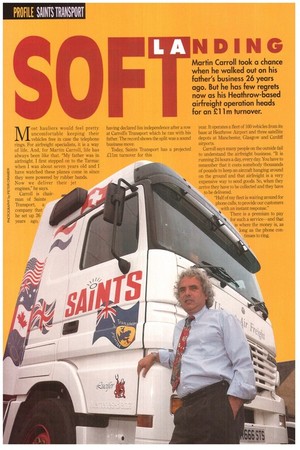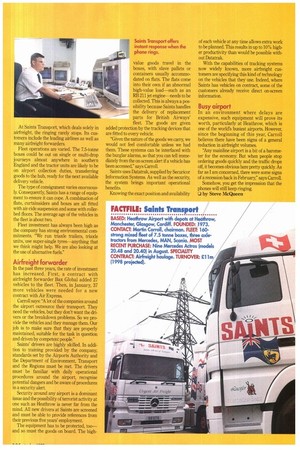Martin Carroll took a chance when he walked out on
Page 50

Page 51

If you've noticed an error in this article please click here to report it so we can fix it.
his father's business 26 years ago. But he has few regrets now as his Heathrow-based airfreight operation heads for an Cl 1 m turnover.
Most hauliers would feel pretty uncomfortable keeping their vehicles free in case the telephone r ngs. For airfreight specialists, it is a way of life. And, for Martin Carroll, life has always been like that. "My father was in airfreight. I first stepped on to the Tarmac when I was about seven years old and I have watched these planes come in since they were powered by rubber bands. Now we deliver their jet engines," he says.
Carroll is chairman of Saints Transport, a company that he set up 26 years ago, having declared his independence after a row at Carroll's Transport which he ran with his father. The record shows the split was a sound business move.
Today, Saints Transport has a projected Lllm turnover for this year. It operates a fleet of 160 vehicles from its base at Heathrow Airport and three satellite depots at Manchester, Glasgow and Cardiff airports.
Carroll says many people on the outside fail to understand the airfreight business. "It is running 24 hours a day, every day. You have to remember that it costs somebody thousands of pounds to keep an aircraft hanging around on the ground and that airfreight is a very expensive way to send goods. So, when they arrive they have to be collected and they have to be delivered.
"Half of my fleet is waiting around for
h. phone calls, to provide our customers ' with an instant response." t' There is a premium to pay
for such a service and that is where the money is, as long as the phone con tinues to ring. At Saints Transport, which deals solely in airfreight, the ringing rarely stops. Its customers include the leading airlines as well as many airfreight forwarders.
Fleet operations are varied. The 7.5-tonne boxes could be out on single or multi-drop journeys almost anywhere in southern England and the tractor units are likely to be on airport collection duties, transferring goods to the hub, ready for the next available delivery vehicle.
The type of consignment varies enormously. Consequently, Saints has a range of equipment to ensure it can cope. A combination of flats, curtainsiders and boxes are all fitted with air-ride suspension and some with rollerbed floors. The average age of the vehicles in the fleet is about two.
Fleet investment has always been high as the company has strong environmental commitments. "We run triaxle trailers, triaxle units, use super-single tyres—anything that we think might help. We are also looking at the use of alternative fuels."
Airfreight forwarder
In the past three years, the rate of investment has increased. First, a contract with airfreight forwarder Bax Global added 27 vehicles to the fleet. Then, in January, 37 more vehicles were needed for a new contract with Air Express.
Carroll says: "A lot of the companies around the airport outsource their transport. They need the vehicles, but they don't want the drivers or the breakdown problems. So we provide the vehicles and they manage them. Our job is to make sure that they are properly maintained, suitable for the task in question and driven by competent people."
Saints' drivers are highly skilled. In addition to training provided by the company, standards set by the Airports Authority and the Department of Environment, Transport and the Regions must be met. The drivers must be familiar with daily operational procedures around the airport, recognise potential dangers and be aware of procedures in a security alert.
Security around any airport is a dominant issue and the possibility of terrorist activity at one such as Heathrow is never far from the mind. All new drivers at Saints are screened and must be able to provide references from their previous five years' employment.
The equipment has to be protected, too— and so must the goods on board. The high value goods travel in the boxes, with slave pallets or containers usually accommodated on flats. The flats come into their own if an abnormal high-value load—such as an RB 211 jet engine—needs to be collected. This is always a possibility because Saints handles the delivery of replacement parts for British Airways' fleet. The goods are given added protection by the tracking devices that are fitted to every vehicle.
"Given the nature of the goods we carry; we would not feel comfortable unless we had them. These systems can be interfaced with the burglar alarms, so that you can tell immediately from the on-screen alert if a vehicle has been accessed," says Carroll.
Saints uses Datatrak, supplied by Securicor Information Systems. As well as the security, the system brings important operational benefits.
Knowing the exact position and availability
of each vehicle at any time allows extra work to be planned. This results in up to 10% higher productivity than would be possible without Datatrak.
With the capabilities of tracking systems now widely known, more airfreight customers are specifying this kind of technology on the vehicles that they use. Indeed, where Saints has vehicles on contract, some of the customers already receive direct on-screen information.
Busy airport
In an environment where delays are expensive, such equipment will prove its worth, particularly at Heathrow, which is one of the world's busiest airports. However, since the beginning of this year, Carroll believes there have been signs of a general reduction in airfreight volumes.
Any mainline airport is a bit of a barometer for the economy. But when people stop ordering goods quickly and the traffic drops off, it becomes obvious here pretty quickly. As far as I am concerned, there were some signs of a recession back in February," says Carroll.
Somehow, you get the impression that the phones will still keep ringing.
0 by Steve McQueen FACTFILE: Saints Transport BASED: Heathrow Airport with depots at Heathrow, Manchester, Glasgow, Cardiff. FOUNDED: 1973. CONTACT: Martin Carroll, chairman. FLEET: 160strong mixed fleet of 7.5 tonne boxes, three axletractors from Mercedes, MAN, Scania. MOST RECENT PURCHASE: Nine Mercedes Adros (models 20.48 and 20.40) in August. SPECIALRY CONTRACT: Airfreight haulage. TURNOVER: Ellin (1998 projected).












































































































